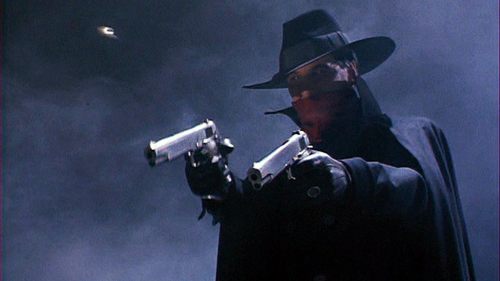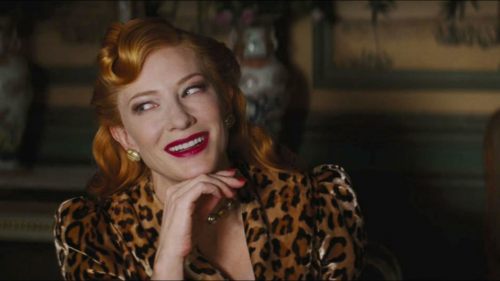BLUE JASMINE Review: Woody Allen’s Latest Is Disturbingly Great
Cate Blanchett is outstanding in Woody Allen's Blue Jasmine, to say the least. A woman of high society, Blanchett loses everything when her husband Hal (Alec Baldwin) is convicted of Ponzi schemes, reminiscent of the Bernie Madoff scandal. Blanchett's Jasmine takes a staggering tumble into a life of destitution, robbed of her friends, her money, and her sanity, and is forced to move in with her working class sister Ginger in New York.
As Jasmine, Blanchett gives an unnerving and enervating performance, filled with fits and shakes, pill-popping and alcoholism, as she struggles to maintain her carefully crafted identity -- but her porcelain exterior is already cracked and falling apart. Once she moves in with Ginger, she's forced to confront the harsh realities of life, the kind of stuff she's never had to consider: going back to school, choosing an occupation, taking a menial day job, and interacting with people who have had to live in this reality their entire lives -- they just don't understand why this is so hard for her. Maybe they understand what she hasn't: when you hit rock bottom, there's just nothing there. Watching Jasmine interact with Ginger and attempt to start fresh in New York is like watching people pick at a walking raw nerve.
And while much of this reads like Poor Little Rich Girl, Allen and Blanchett are able to find the arrhythmic heart at the center of Jasmine's character, a woman pushed over the edge of sanity, who has conversations with herself -- the kinds of conversations that sound as if she's practicing interactions, careful always to tell her story as if she still has a modicum of poise and civility. The behavior is pathological and obsessive compulsive, born of a need to always seem well-rehearsed and well-spoken, but with her life stripped away from her, the behavior becomes something dark and unsettling. The more you repeat a lie out loud, to yourself or others, the more it becomes the truth.
While Blue Jasmine is first and foremost a character study and a showcase for Blanchett's impeccable acting skills, it's also a meditation on the idea of what we deserve versus what we think we deserve, and the intersection of standards and entitlement. Jasmine and her sister Ginger, played by the equally praise-worthy Sally Hawkins, are adopted sisters -- Jasmine was always the prim and proper and feminine one, favored by their adoptive parents over the unruly Ginger. We get so little of the back story concerning their childhood, but it's enough to explain Ginger's insecurities. She doesn't think she deserves much better than the crude, short-tempered, blue collar guys she has relationships with because she doesn't think she's capable of doing any better, and she doesn't see her own value. Jasmine points this out to her, and it's difficult to say if Jasmine is right, or if she's projecting her own lofty standards onto her sister. Ginger has clear issues with abandonment, insecurity, and worth, but Jasmine's issues provide a beautiful counter-balance. Jasmine is entitled, feels that she deserves so much more than she probably does, and thinks incredibly highly of herself.
When you strip this idea down to its core, you have a very simple story about two sisters who exist on opposing ends of a spectrum, bound together by their origins, each having pulled from the same delicate thread, each taking it down a different path.
But aside from Blanchett's shell-shocked and deeply disturbing performance as what amounts to an epileptic Fabergé egg, Blue Jasmine is a centerpiece for the acting talents of people like -- shockingly -- Andrew Dice Clay, the former foul-mouthed comedian known for his dirty nursery rhymes. Clay plays Ginger's ex-husband Augie, a victim of Hal's Ponzi scheme, and his performance is filled with nuance and heartbreak as a guy who was almost able to build a life for his family, but had everything taken away from him by a rich opportunist. Here is a guy who represents so many working class Americans, who gained wealth through the luck of winning the lottery, a system that exploits poor people like Augie and Ginger and so rarely rewards them. Though Jasmine and Ginger reflect off of each other, it's Augie that serves as a true inverse of Jasmine's character.
What's often great about a Woody Allen movie that doesn't star Woody Allen is the way you can hear those specific Allen-esque phrases and rhythms delivered by someone else. Blue Jasmine isn't as frenetic and jazzy with its dialogue as other Allen films, but you can occasionally hear someone like Blanchett or Hawkins delivering a line that is distinctly Woody Allen. Blue Jasmine isn't just a career highlight for Blanchett (who deserves a mountain of awards), it's a real showpiece for Allen, who combines wit, heart, and gut-wrenching neurosis in a way that feels effortless. Blanchett's Jasmine isn't a neurotic in the same sense that most of the characters are in Allen's films (and that he himself often plays), all endearing and unwittingly witty; she's a neurotic in the purest, most unsettling sense, and Allen takes a character with whom we can hardly sympathize and does something absolutely remarkable: he makes us empathize.



